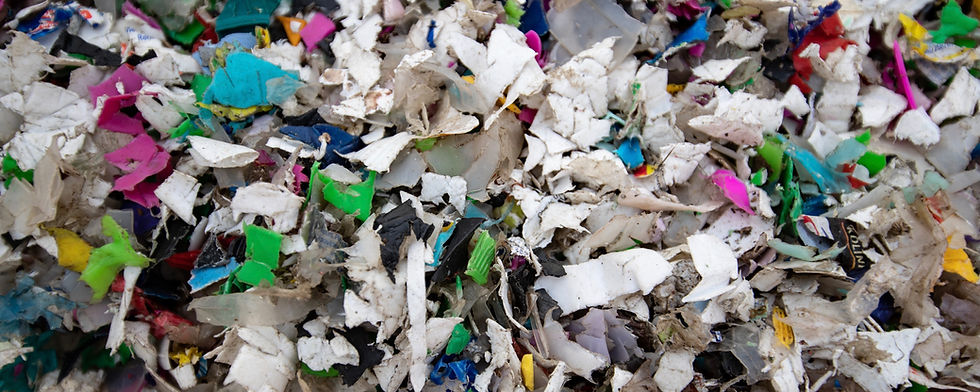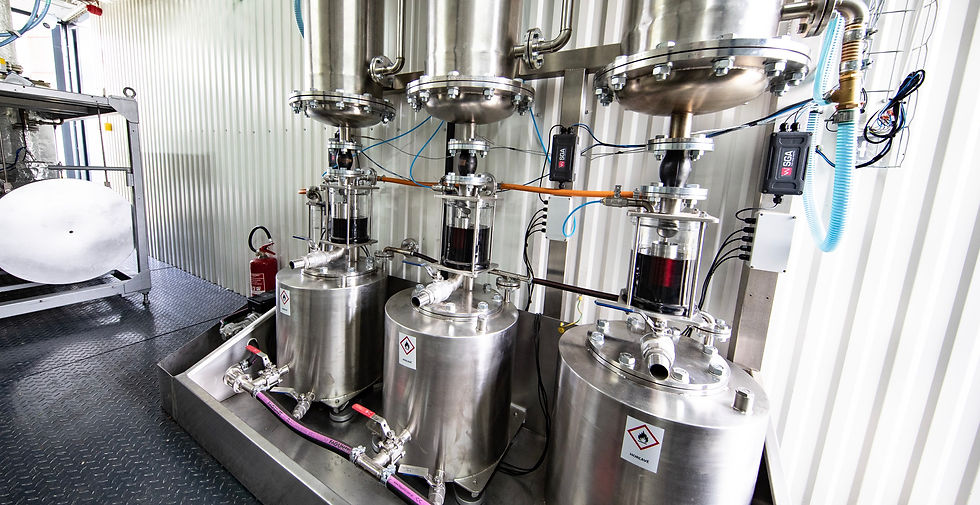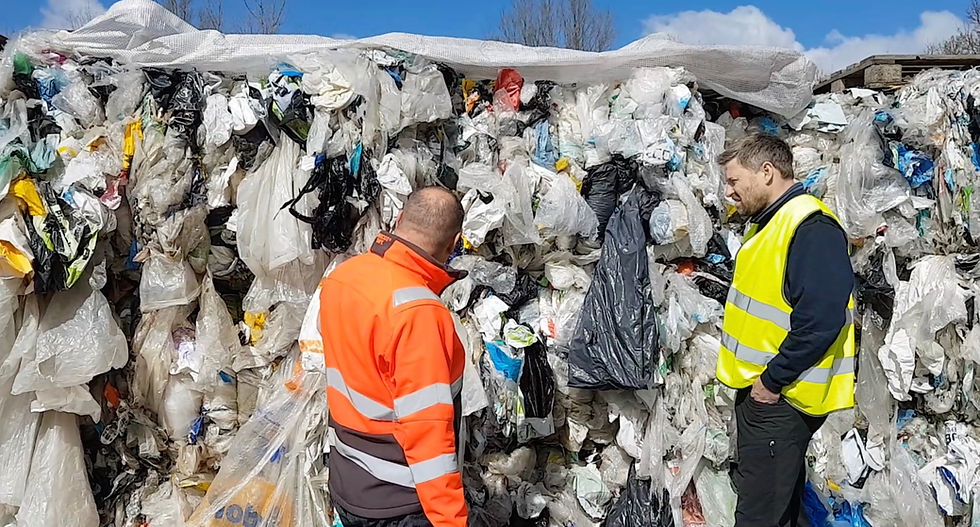
WHAT IS OPTIMUS
A unique mobile technology for effective conversion of plastic waste into pure, high-quality resource - oil, that can be directly used in industry - for example, in the petrochemical, refinery, power, and transport industries.




-
Unique Technology
-
Extremely effective chemical recycling
-
Converts plastic into pure, quality oil
-
Inside its own ISO container
-
High quality of oil
-
Direct use in industry
-
Modular and scalable solution
-
Plug&Play device - fast installation
R&D - TIMELINE
In the beginning, there was the vision of streamlining the way of recycling waste to a much more efficient ...
Laboratory prototype
with 2kg capacity.
Increase capacity to 1000kg / day.
Fully functional prototype with vertical cooling.
We're going to the market.
Official launch of the technology into trial operation.

We're headed
to market.
1st prototype with a capacity of 200 kg / day.
Increase the overall efficiency of the technology, improve the cooling system.
Technology certification, ready for market. Beginning of the 2nd generation development.

THE TECHNOLOGY
The OPTIMUS technology works on the principle of a chemical process of depolymerization, through which the sorted waste plastic is transformed into oil, which can be used, for example, as an ecological fuel.
-
The purity of the end product is unique among the available solutions worldwide.
-
Thanks to its great modularity, it is possible to connect multiple devices (modules) together.
-
OPTIMUS is the only mobile device - it is placed in its own ISO container (facilitates shipping and truck transport).
OPTIMUS processes sorted plastic municipal waste. The processed plastics are transformed into high-quality oil for direct use. Plastic waste oil has 4 main applications:
1
PETROCHEMICAL INDUSTRY
2
REFINERY INDUSTRY
3
ENERGY
4
TRANSPORT AND OTHER
MECHANIZATION
In the petrochemical industry, a number of products are also produced from this oil. At the same time, it can be returned to the plastics production process, saving the original raw material - oil.
The oil can be mixed with conventional fuels in refinery plants. Its quality guarantees minimal costs of this use, so it is not necessary to separate or clean the oil excessively.
When used in the power industry, oil helps reduce emissions, saving oil as the primary raw material for diesel fuel, which is burned in generators of electricity or heat.
Oil produced by this technology can be used as a fuel or fuel admixture, for example in marine/river transport, mining, and other large machinery and mechanization.

facts & figures
1
OPTIMUS POL1V has been launched after 9 years of R&D and testing on multiple prototypes.
Our technology converts the low value, end of life plastics that are typically unable to be mechanically recycled. Optimus is now a commercially deployable technology which provides a significant opportunity to Waste Management Companies and Governments. The POL1V provides one jigsaw piece /solution to the jigsaw puzzle to halt the Global Environmental Plastic Pollution epidemic.
2
OPTIMUS works on the principle of thermal decomposition
The basis of the technology is the thermal decomposition of plastic polymers, reformation and subsequent distillation back into a synthetic liquid form. The scientific name is Thermal Depolymerization and is simply the reverse of the original process used to produce polymers/plastics from petroleum products. The technology can separate light and heavier gas components and, at the end of the process, together with condensation, turn them back into a synthetic hydrocarbon liquid.


3
OPTIMUS is extremely effective way of recycling
In order to achieve maximum efficiency of the whole system, we have developed a solution that would work reliably both technically and economically. The result is a POL 1V line that can reliably convert 1kg of plastic sorted material with a maximum consumption of 1kWh to 1 liter of quality raw material - oil.
1kg + 1kWh = 1L
4
OPTIMUS is modular and therefore highly scalable
One tonne of waste plastics is processed per day in each Module (located in its own adapted 40ft ISO Container). This facilitates simple, low cost and fast installation. OPTIMUS Technology is flexible enough to treat plastic waste at its source, e.g. at Material Recycling Facilities or next to landfill sites or factories and therefore reduces the cost of transporting the plastic feedstock. A typical plastic conversion site will operate between 4 – 40 Modules.


5
OPTIMUS converts end of life plastic waste into a clean instantly valuable raw material
The synthetic liquid / Oil produced is of a high quality and can be used directly in industry. The process re-uses the waste plastic reducing the requirement for the manufacturing of virgin plastic feedstock/ hydrocarbons. In turn thus reducing the costs of other organic origin or impure synthetic oils. In order to produce 1 litre of plastic oil, only 1 kg of plastic waste and 0.85 kWh of electricity is needed. Each OPTIMUS Technology module has the daily processing capacity of 1.000 kg of plastic waste and an output of 1.000 litres of oil.

PLASTIC WASTE PROBLEM IS A GLOBAL SCALE PROBLEM
Waste companies and environmentalists are tackling a particular problem in the northern part of Denmark - OPTIMUS represents a big leap for them and the potential to solve the problem.
SOME WORRYING FACTS
-
Every year, more than 8 million tons of plastics enter the ocean. It is as if a full plastic waste truck tipped into the sea every minute. Plastics account for up to 80 percent of all marine waste.
-
Up to 51 trillion plastic micro-particles - 500 times more than there are stars in our galaxy - are polluting the oceans and seas and seriously endanger life in the oceans.
-
More than 800 species are damaged by marine waste. 40 percent of marine mammals and 44 percent of waterfowl species suffer from ingestion of marine waste.
-
Plastic waste kills up to a million seabirds, 100,000 marine mammals, sea turtles, and countless fish every year. Plastics remain in the ecosystem for many years and harm marine animals every day.
-
According to some estimates, at the speed with which we dispose of plastic products - bottles, bags, and disposable cups - by 2050, there will be more plastic in the ocean than fish, and an estimated 99 percent of seabirds will have plastic fragments in their bowels.
source: osn.cz
THE STORY OF THE PLASTICS AND CIRCULAR ECONOMY

OPTIMUS IN MEDIA

14. ledna 2017
On the podium in the Vodafone Idea of the Year 2019 competition.

20. červen 2020
Česká televize, reportáž
Reportáž na ČT24 a ČT1 - hlavní zpravodajský pořad - Události.

11. června 2019
Used plastic bags and bags. Plastic cups. Food packaging. And many other plastics ....

9. července 2020
startupjobs.cz
Online magazín o startupech zveřejnil článek o naší technologii.

14. ledna 2017
Audiovisual media
Reports on CT24
Reportage on online TV Tývka

10. srpna 2020
czechcrunch.cz
Článek o technologii OPTIMUS na portále CZECHCRUNCH.CZ



